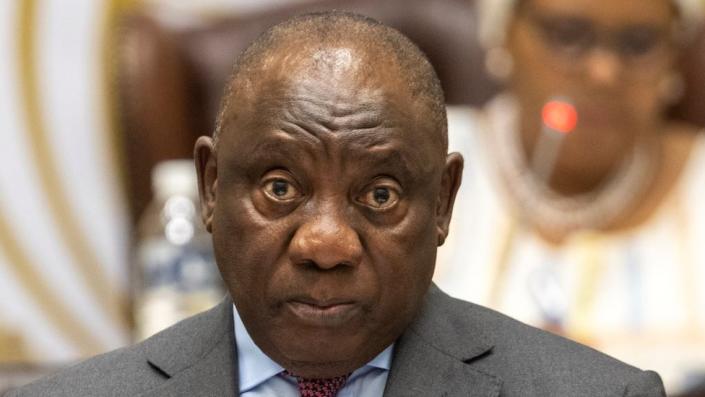
A damning report from a panel of legal experts into accusations that President Cyril Ramaphosa covered up the theft of $4m (£3.3m) in cash from his farm in 2020 has raised uncomfortable questions for South Africa’s leader.
The panel – headed by a former chief justice – described some of his explanations as “improbable”.
Mr Ramaphosa has a case to answer, not just to parliament but to all South Africans, critics say.
Judging by the fervent reaction from opposition parties, some of whom are calling for him to step down immediately, this scandal has the potential to cost him his job.
In a 138-page submission made to the panel of serving and retired judges, President Ramaphosa denied that there was anything untoward about the money stolen on his private farm, saying it was from the proceeds of buffalo sold for $580,000 in cash to a Sudanese national, Mustafa Mohamed Ibrahim Hazim, in late 2019.
However, Mr Hazim has not appeared in public and little is known about him.
The panel questioned why the invoice presented to them didn’t contain any details that would make him identifiable. There was only his name, no business address or ID number.
“I respectfully submit that all of the ‘charges’ I have been called to answer are without any merit,” Mr Ramaphosa wrote, adding that many of the allegations were based on “hearsay”. He requested that the matter not be taken any further.
But it has not gone away and there is pressure on the president to resign or face impeachment proceedings.
It is it hard to miss the irony of the claims and the quagmire the president finds himself in.
This is after all the man whose political image and rise to the presidency was built on fighting corruption, which dogged both the governing African National Congress (ANC) and the country as a whole under his predecessor President Jacob Zuma.
Call for early elections
What then is to be made of Mr Ramphosa’s handling of “Farmgate”?
His party is feverishly debating how the president should handle the report, party sources have told the BBC.
While some want him to adopt a wait-and-see approach, others, presumably from an opposing ANC faction, want him gone to prevent further damage to the party, they say.
Officially, the president’s office has said he will address the report once he has finished studying it.
Mr Ramaphosa enjoyed some grace when he assumed power not only from the public but business and civil society – even local media in some ways.
He made grand promises of a new dawn for South Africa under his leadership and implored citizens to believe that he could turn things around, that the days of corruption scandals would be a thing of the past. But that grace is now lost.
The country’s main opposition says that based on this report, the president has been found wanting.
The Democratic Alliance announced that it will use parliament’s sitting next week to put forward a motion calling for early elections – saying the damning allegations against Mr Ramaphosa show that the ANC must be removed from power.
“The report is clear and unambiguous. President Ramaphosa most likely did breach a number of Constitutional provisions and has a case to answer. Impeachment proceedings into his conduct must go ahead, and he will have to offer far better, more comprehensive explanations than we have been given so far,” the party said in a statement.
The report – made up of three volumes – raises questions around Mr Ramaphosa’s written submission:
-
Why did the president have some $580,000 stored inside a sofa?
-
Why was the theft of that money not reported to the police two years ago?
-
Why do the buffalo he says were sold remain on the farm?
In Mr Ramaphosa’s explanation, a lodge manager at the farm first stored the money in a safe, but later moved it to a sofa in a spare bedroom “inside my private residence, because he thought it was the safest place, as he believed nobody would break into the president’s house”.
The panel believed that explanation needs further scrutiny.
The judges’ scope was limited to recommending that parliament take action.
If MPs decide that an impeachment committee should investigate further and they find the president guilty of serious misconduct, that would set in motion the process for an impeachment vote.
Ultimately it will come down to a vote – the motion to impeach needs a two-thirds majority in parliament to pass.
While the ANC has the numbers to prevent that from happening, the party is also hugely divided. Those against him may see this as an opportunity to vote with opposition parties to remove him.
We are some way from such a vote but in the court of public opinion what has already been established is damning.
‘Bad for the ANC’
Local radio stations and social media have been abuzz with mixed views from South Africans – some believe he’s being targeted by his political foes, while others have expressed disappointment and want him gone.
“This is very bad for the ANC,” political analyst Oscar Van Heerden told Newzroom Afrika.
“No organisation wants a leader who is being questioned in this manner. The ANC has to think about political considerations. Is it in our best interest to get rid of our leader at this time? The ANC has to make a call that will stand them in good stead for the 2024 elections.”
At best this debacle puts Mr Ramphosa’s moral standing into question. At worst it suggests an abuse of power and perhaps the constitution – the same constitution he helped draft in the early 1990s.
His party, which has defended its leaders through many a scandal in the past, is only compelled to sack him if he is the subject of criminal charges – and he is not.
Still, these developments, ahead of an ANC conference this month, where Mr Ramaphosa had seemed to be a shoe-in to be re-elected as party leader, have placed the veteran politician and game farmer in a rather precarious situation.
Seven things about Cyril Ramaphosa:


-
Born in Soweto, Johannesburg, in 1952
-
Detained in 1974 and 1976 for anti-apartheid activities and launched the National Union of Mineworkers in 1982
-
Chairman of the National Reception Committee which prepared for Nelson Mandela’s release from prison in 1990
-
Became an MP and chairman of constitutional assembly in 1994
-
Moved full-time into business in 1997, becoming one of South Africa’s richest businessmen
-
On Lonmin board during 2012 Marikana massacre
-
Elected ANC leader in 2017 and on 15 February 2018 became president after the resignation of Jacob Zuma




